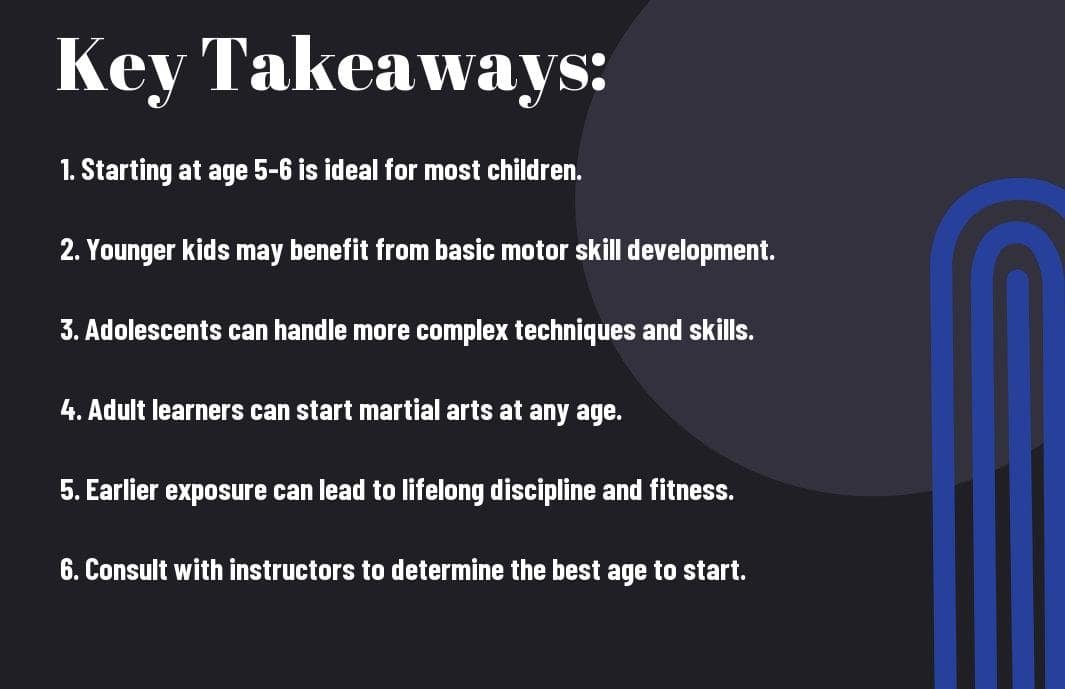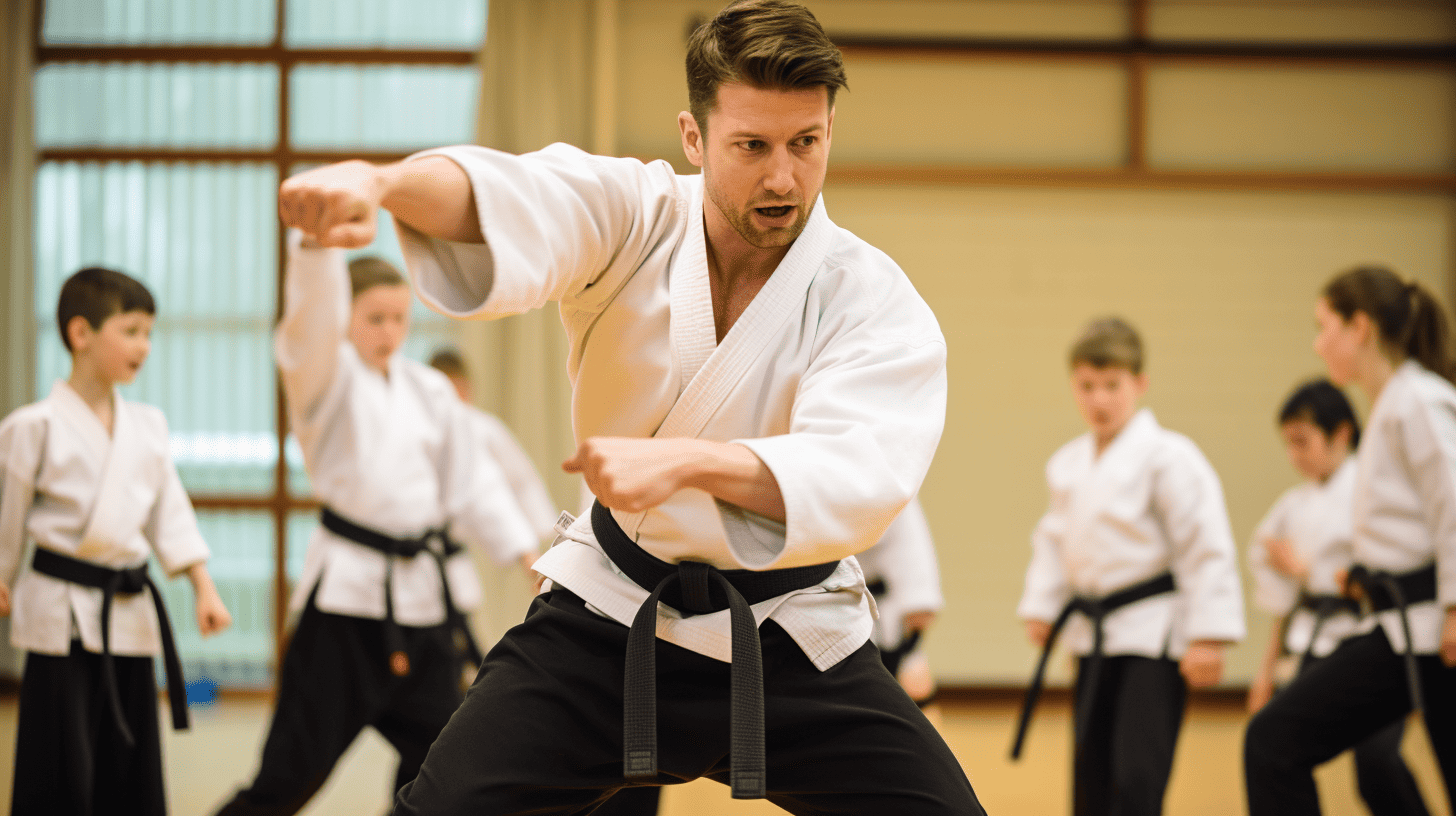Are you wondering what is the best age to start learning martial arts? Martial arts is a disciplined form of physical and mental training that can benefit individuals of all ages. However, it is important to consider the dangers of starting too young or too late. You may find this blog post helpful in determining the most suitable age for you or your child to begin martial arts training.
Key Takeaways:
- Physical development: The best age to start learning martial arts is around 5-6 years old when children have developed the necessary physical coordination and strength.
- Emotional maturity: It is important for children to have a certain level of emotional maturity before starting martial arts, which is typically around 5-7 years old. This allows them to understand and follow instructions, control their emotions, and work well with others.
- Learning capacity: Children aged 5-9 have a high capacity for learning new skills and techniques, making it an ideal time to start martial arts training and develop a strong foundation.
- Sense of discipline: Starting martial arts at a young age helps children develop a sense of discipline, respect, and self-control, which are valuable life skills that they can carry into adulthood.
- Long-term commitment: By starting at a younger age, children have the opportunity to progress and master their martial arts skills over time, potentially leading to a lifelong passion and dedication to the practice.
Understanding the Flexibility and Aptitude for Martial Arts at Different Ages
When it comes to learning martial arts, the ideal age to start can vary depending on individual flexibility, aptitude, and physical development. Understanding the differences between learning martial arts at different ages can help you make an informed decision about when to begin your training.
Learning martial arts in childhood
If you start learning martial arts in childhood, you have the advantage of being more flexible and adaptable, making it easier for you to learn and master the physical techniques. Children also tend to have a natural fearlessness and enthusiasm, which can be beneficial for embracing the challenges of martial arts training. However, it’s important to find an instructor who understands the unique needs of children and can foster a supportive, non-competitive environment to ensure their safety and well-being.
Learning martial arts in adolescence
During adolescence, you may experience a rapid growth spurt, which can affect your coordination and balance. However, this period also presents an opportunity to develop strength and power as your body continues to mature. Adolescents are often more focused and disciplined in their training, making it easier for them to grasp complex martial arts techniques. It’s important to be mindful of the risk of injuries during this stage, so proper supervision and guidance from a qualified instructor are essential.
Learning martial arts in adulthood
As an adult, you may have a greater attention span and ability to understand and implement the principles of martial arts. Your physical strength and endurance are likely at their peak, providing a solid foundation for learning more advanced techniques. However, the risk of injury may be higher due to the body’s reduced flexibility and slower recovery time. It’s crucial to listen to your body and take the necessary precautions to avoid overexertion. Remember that martial arts training is a journey, and consistency and patience will be key to your progress.
The Role of Physical and Mental Maturity in Martial Arts Training
When considering the best age to start learning martial arts, it’s important to take into account the role of physical and mental maturity in martial arts training. Both physical readiness and mental maturity play a crucial role in determining when a person is ready to begin their journey in martial arts.
Physical readiness for martial arts
Physical readiness for martial arts is essential for preventing injuries and ensuring that you can keep up with the demands of training. Your body needs to be strong and developed enough to handle the physical challenges that come with martial arts. This includes having a certain level of strength, flexibility, and endurance. If you are too young or not physically prepared, you may be at a higher risk of injury, which can hinder your progress and enjoyment of martial arts.
Mental maturity and martial arts
In addition to physical readiness, mental maturity is also a key factor in determining when you are ready to start learning martial arts. Martial arts training requires discipline, focus, and the ability to handle high-pressure situations. You need to be mentally prepared to stay calm and focused in challenging situations, as well as be able to follow instructions and understand the importance of respect and self-discipline. If you are not mentally mature enough, you may struggle to fully grasp the principles and techniques of martial arts.
The Advantages and Challenges of Learning Martial Arts at Various Ages
When it comes to learning martial arts, the age at which you start can significantly impact your journey. Each age group comes with its own set of advantages and challenges that you should consider before embarking on this path.
Young learners: Advantages and Challenges
If you start learning martial arts at a young age, you have the advantage of developing discipline, focus, and coordination early on. Your flexibility and ability to learn new movements are also at their peak during this time. However, the main challenge for young learners is lack of strength and maturity. It’s important to start with the right fundamentals and to avoid pushing yourself too hard physically.
Teenage learners: Advantages and Challenges
As a teenager, you have the advantage of being able to fully understand the concepts and philosophies behind martial arts. You also have the physical strength to perform more intense training and techniques. However, the challenge is dealing with peer pressure and distractions that can steer you away from training. It’s crucial to stay focused and committed to your practice.
Adult learners: Advantages and Challenges
Starting martial arts as an adult comes with the advantage of mental maturity and a strong sense of commitment. You understand the importance of setting goals and staying dedicated to achieve them. However, the challenge is that your body may not be as flexible or quick to pick up new movements. It’s essential to be patient with yourself and adapt your training to suit your body’s capabilities.

Conclusion
With these considerations in mind, it’s important to remember that the best age to start learning martial arts ultimately depends on your individual child. Starting martial arts at a young age can provide a range of physical, mental, and social benefits. However, it’s crucial to ensure that your child is ready both physically and emotionally. So, if you’re considering enrolling your child in martial arts, it’s worth consulting with a qualified instructor to determine the best time for them to begin their training. For more information on this topic, you can visit What is the best age for a child to start a martial art.
FAQ
Q: What is the best age to start learning martial arts?
A: The ideal age to start learning martial arts is between 5 and 6 years old. At this age, children have developed enough physically and mentally to begin learning the fundamental skills and discipline required for martial arts.
Q: Can adults start learning martial arts?
A: Absolutely, adults can start learning martial arts at any age. It’s never too late to begin. Many adults find that martial arts not only helps them stay fit and active, but also provides a mental and emotional outlet for stress relief and self-improvement.
Q: Should toddlers start learning martial arts?
A: Generally, toddlers are not developmentally ready to start learning martial arts. It’s important for toddlers to focus on basic motor skills and social development before undertaking martial arts training. It’s recommended to wait until they are at least 4 or 5 years old.
Q: Is there an upper age limit for learning martial arts?
A: There is no upper age limit for learning martial arts. Many people continue to practice and improve their skills well into their later years. In fact, martial arts can be particularly beneficial for seniors, helping them maintain balance, flexibility, and overall health.
Q: Can people with physical disabilities learn martial arts?
A: Yes, people with physical disabilities can absolutely learn and benefit from martial arts. Many schools offer adaptive programs to accommodate individuals with various disabilities. Martial arts can provide a sense of empowerment and improved physical and mental wellbeing for people of all abilities.



